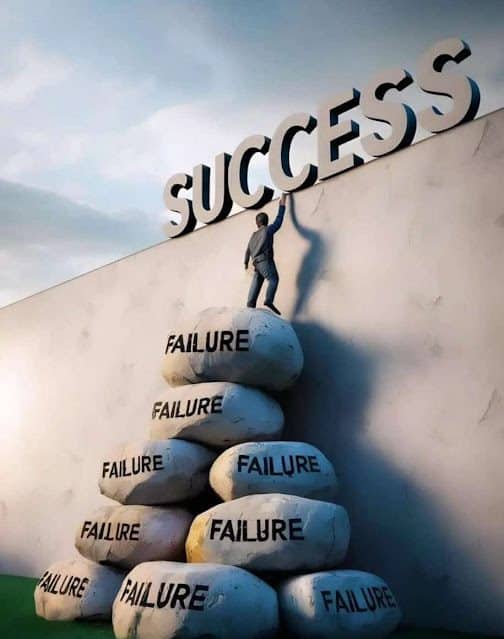Why a Series of Failures Before Success Matters
In today’s world, we often see success as something that happens quickly. But, for many famous people, it was their failures that led them to success. These setbacks and how they bounced back made them who they are today.
Think of Thomas Edison, a man known for his many inventions. Before he changed the world with the light bulb, he tried thousands of times and failed. But he didn’t see those as failures. He said, “I have not failed. I’ve just found 10,000 ways that won’t work.” This way of thinking helped him succeed.
Key Takeaways
- Failures can shape personal growth and resilience
- Setbacks are opportunities to learn and improve
- Perseverance and determination are key to overcoming adversity
- A series of failures before success is a common path for many accomplished individuals
- Embracing the journey, rather than focusing solely on the end result, can lead to greater fulfillment and long-term success
Embracing the Journey: The Importance of Failures
The path to success is not always easy. It’s often filled with failures and setbacks before reaching the top. Embracing failure might seem tough, but it’s key to long-term success.
Redefining Failure as a Stepping Stone
Failure isn’t the opposite of success; it’s part of the journey. Redefining failure as a learning opportunitychanges how we see mistakes. It turns them into chances to learn and grow.
Cultivating Resilience and Perseverance
Building resilience and perseverance helps us turn failure into growth. By facing challenges, we get stronger. This strength helps us bounce back and keep going, even when it’s hard.
Seeing failure as part of the journey helps us reach our full potential. It opens up new chances to learn and grow. Every setback becomes a step forward.
“Failure is not the opposite of success; it’s part of success.” – Arianna Huffington
series of failures before success why
Success often comes after a long journey filled with failures. Facing repeated setbacks might seem tough, but seeing the value in failures can help you reach your full potential. This part will show why facing many failures before success is key to lasting victory.
The journey to success, with its series of failures before success, is as important as reaching the goal. Every failure is a chance to learn, grow, and improve. By understanding the importance of failures, we become more resilient, adaptable, and aware of our strengths and weaknesses.
“Failure is not the opposite of success; it is a part of success.” – Arianna Huffington
Embracing failures helps you develop a mindset focused on growth. Seeing setbacks as stepping stones, not hurdles, opens up new possibilities. This way, failures become valuable lessons that boost your innovation, problem-solving, and lead to lasting success.
- Failures give important feedback, showing where you can get better and tweak your plans.
- Every failure builds perseverance, grit, and the will to overcome obstacles.
- Going through a series of failures before success helps you know yourself better. You learn about your strengths, weaknesses, and what you need to succeed.
The path to success is not straight. By accepting the series of failures before success and understanding the importance of failures, you can tap into your true potential. This leads to amazing achievements.
Learning from Missteps: Turning Mistakes into Growth
Mistakes are a normal part of life, but they can also be stepping stones for growth. Learning from mistakes is key to a mindset that turns failures into successes. This approach helps us grow personally and professionally.
Developing a Growth Mindset
At the core of this approach is developing a growth mindset. Instead of seeing mistakes as permanent failures, we see them as chances to learn and get better. This mindset lets us change how we see mistakes and use them to grow.
- Reframe Failures: Change your thinking from “I failed” to “I have a chance to learn.”
- Embrace Feedback: Look for constructive criticism and use it to grow.
- Experiment and Iterate: See each mistake as a way to try something new and improve your plans.
- Celebrate Small Wins: Acknowledge and celebrate your progress, even when it’s hard.
With this mindset, you can turn learning from mistakes into a powerful tool for growth. It helps you move forward and reach your goals.
“Mistakes are not something to be afraid of, but rather opportunities to learn and grow.”
Adopting this mindset opens up new possibilities. It helps you use learning from mistakes to drive your success.
The Grit Factor: Determination and Delayed Gratification
Long-term success needs two key qualities: grit and delayed gratification. Grit is about determinationand perseverance. It pushes people through tough times and challenges.
Delayed gratification means choosing a bigger reward later over quick satisfaction now. These traits together help people beat obstacles and stay focused on their goals, even when it’s hard.
Many successful people have shown the grit factor. They stick to their goals and delay short-term rewards for long-term benefits. Angela Duckworth, a famous psychologist, has studied grit and its link to success. She found it’s key to reaching goals.
“Grit is passion and perseverance for very long-term goals. Grit is having stamina. Grit is sticking with your future, day in, day out, not just for the week, not just for the month, but for years, and working really hard to make that future a reality.” – Angela Duckworth
Having a mindset of grit and delayed gratification builds resilience and determination. It helps people get through tough times and stay focused on their big goals, even when quick wins seem tempting.
The grit factor is a key to long-term success. It helps people overcome challenges, learn from mistakes, and reach their biggest goals. By using grit and delayed gratification, anyone can grow personally and professionally.
Conclusion
Looking back at this article, we see that facing failures before success is a normal part of growing. It helps us become stronger, think differently, and find the strength to keep going.
We’ve learned that failure is a chance to learn and get better, not a barrier. It shows we’re brave enough to try new things and aim high.
In the end, failures teach us valuable lessons. By using our mistakes to grow and staying strong, we can reach our goals. This approach helps us discover our full potential and achieve success.
FAQ
Why is a series of failures before success important?
Having many failures before success is key. It builds resilience and perseverance. Failures teach us valuable lessons and help us grow.
How can reframing failures as opportunities lead to personal growth?
Seeing failures as chances to grow helps us stay positive. It lets us learn from our mistakes. This way, we can improve and achieve more.
What is the importance of developing a “grit” factor?
“Grit” is about being determined and patient. It’s vital for overcoming hurdles and achieving big goals. People with grit keep going through tough times and stay focused on their dreams.
How can a growth mindset help in learning from mistakes?
A growth mindset sees failures as chances to learn and get better. It helps us tackle challenges positively. We look for feedback and keep improving our skills.
Why is it important to embrace the journey, including the failures, on the path to success?
Accepting the whole journey, with its failures, is crucial. It builds resilience and deepens self-understanding. The hard times teach us the most and shape our character.
—
References:
Teach-USA – https://www.teach-usa.net
Everything Teach-USA stories/information – https://www.pinoyteacherstories.com
About Gemma – https://www.gemmahilotin.com
YouTube- Teach-USA – https://www.youtube.com/c/TeachUSA
HOW TO JOIN? Please email your resume to apply@teach-usa.net

